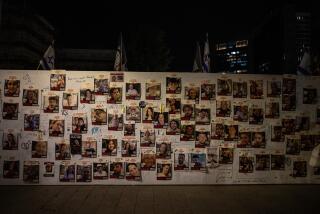U.S. Killing of Terrorists Can Be Justified, Top Army Lawyer Says
- Share via
WASHINGTON — The Army’s top lawyer has concluded that military strikes against terrorists can be justified legally without running afoul of a 1976 presidential order banning assassinations.
Maj. Gen. Hugh Overholt, the Army’s judge advocate general, argues in an eight-page draft memorandum that America’s diplomatic and military bureaucracies have failed for too long to define the term assassination and that thanks to changes in “the nature of the threat,” action against terrorists can be justified under the legal concept of national self-defense.
“The employment of military force against a terrorist or terrorist organization to protect U.S. citizens or the national security of the United States is a legitimate exercise of the international legal right of self-defense and does not constitute assassination,” Overholt concludes.
The existence of the Overholt memorandum was first reported Monday by a trade publication, Defense Week, and quickly acknowledged by Army officials.
Lt. Col. Dick Bridges, an Army spokesman, explained that the service had been encouraging legal debate within the Pentagon, State Department, CIA and other agencies in hopes of producing a common definition of assassination.
Bridges said the Army’s basic “Law of Land Warfare” manual, last revised in 1956, has a definition of assassination that dates back to The Hague Convention of 1907.
That definition states, “It is especially forbidden to kill or wound treacherously individuals belonging to the hostile nation or army.”
The Overholt memo notes that war, in essence, legalizes the “killing of the enemy,” but in peacetime, the standards of conduct must be defined under the U.N. Charter--”which recognizes the inherent right of self-defense of nations”--and domestic laws and regulations.
In 1976, then-President Gerald R. Ford signed a presidential order banning attempts to assassinate foreign leaders.
In the intervening 13 years, “the nature of the threat has changed, rather than the international legal right to respond to the threat,” Overholt wrote.
“It is noted that the terrorist individuals or organizations envisaged as appropriate to necessitate or warrant an armed response by U.S. military forces are well-financed, highly organized paramilitary structures engaged full-time in the illegal use of force,” the memo concludes.
“A national decision to employ military force in self-defense against a legitimate terrorist threat would not be unlike that employed in response to an overt conventional threat.”
More to Read
Sign up for Essential California
The most important California stories and recommendations in your inbox every morning.
You may occasionally receive promotional content from the Los Angeles Times.










